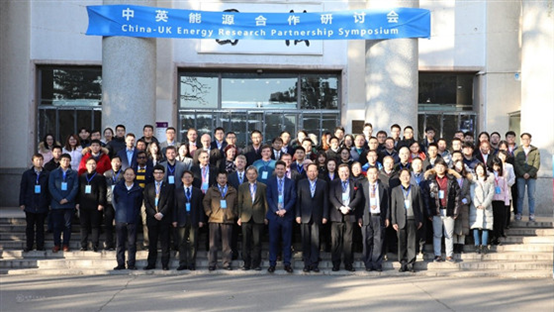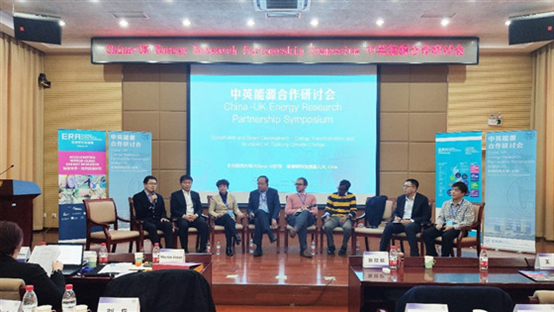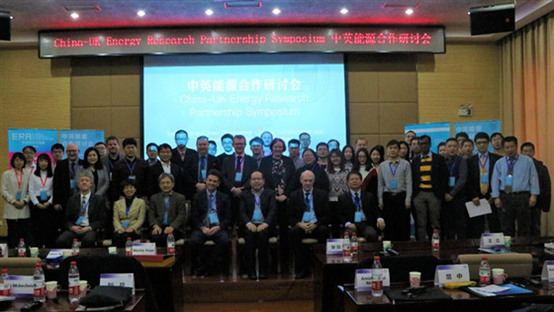News and events from USTB about research, science and technology, social science, art,
faculty and staff, students life and issues happening all around the world.
Topics
Date
Views
The "2020 China-UK Energy Research Partnership Symposium", an international conference hosted by the School of Energy and Environmental Engineering, USTB, was held at USTB on January 13, 2020. More than 120 people attended the conference, and included both international and Chinese attendees. The international delegation was made up of 14 well-known experts from the "Energy Research Accelerator" (ERA), UK, as well as different UK universities and 4 representatives from the British Embassy in China, which was led by Prof. Martin Freer, Director of the Birmingham Energy Institute. The participating universities included the University of Birmingham, University of Nottingham, University of Kiel, University of Loughborough, University of Leicester and University of Warwick. Those attending Chinese representatives were from well-known research institutes and companies in the domestic energy field, such as the Institute of Engineering Thermophysics, the Chinese Academy of Sciences, Beijing University of Technology, the State Power Investment Corporation, Beijing District Heating Group, CRRC, and the Beijing Jingyu Group. Prof. ZHANG Xinxin, former president of USTB, Prof. XING Yi, dean of the School of Energy and Environmental Engineering and Prof. FENG Qiang, director of the Office of International Affairs, were in attendance. The theme of the conference was "Sustainable and Green Development-Energy Transformation and its Impact on Tackling Climate Change".

Group photo of participants
First, Prof. ZHANG Xinxin delivered a speech on behalf of USTB. In his speech, he gave a warm welcome to the attendees and expressed his sincere gratitude for their participation, and then wished the conference success. He spoke on the energy development and consumption in China for the modern era, giving particular emphasis on the need for improving energy efficiency. He then detailed the long history of cooperation between USTB and the University of Birmingham. To conclude, he expressed his belief that the "China-UK Energy Research Partnership Symposium" was the crystallization of cooperative efforts between Chinese and British academics. Then Dr. Glen Noble, British Embassy in China, Prof. Freer and Prof. FENG delivered their remarks respectively. They put forward proposals for common energy development goals and cooperative efforts between China and the UK. They each expressed the hope that companies and institutions would actively invest, share experience, work to constantly improve the quality of their partnerships and jointly promote the commercialization of scientific and technological achievements.

Prof. Martin Freer and Dr. LIU Bing hosted the seminar

Group photo of the seminar
The conference covered five topics. Experts from the ERA and Chinese representatives gave a series of lectures on the first four topics. They delivered brief introductions on renewable energy, intelligent energy, decarbonizing transportation, the viability of emerging energy technologies, energy integration, thermal energy storage, hydrothermal carbonization, new theories and technologies for the blast furnace low carbon ironmaking process, the development of USTB’s energy and power engineering disciplines, IET and the research progress of CAES, and the energy supply of the Chinese cities. The attendees focused on the frontiers and hots pot issues of research in the energy field, while also highlighting the important scientific and industrial research achievements of China and UK in recent years. The fifth topic concerned cooperation between China and UK in energy storage, hydrogen energy, wind energy, solar energy, biomass energy, carbon capture, and energy decarbonization. Finally, the two sides agreed that urban and rural heating, industrial decarbonization, and energy storage technologies would be the main areas of energy cooperation between China and UK in the future. In the process of cooperation, China and UK would work together to promote innovative and low-carbon energy development, incentive policies for reform, accelerate the global low-carbon energy development process, and lay a solid foundation for future energy co-operation between China and UK.
Topics
Date
Views